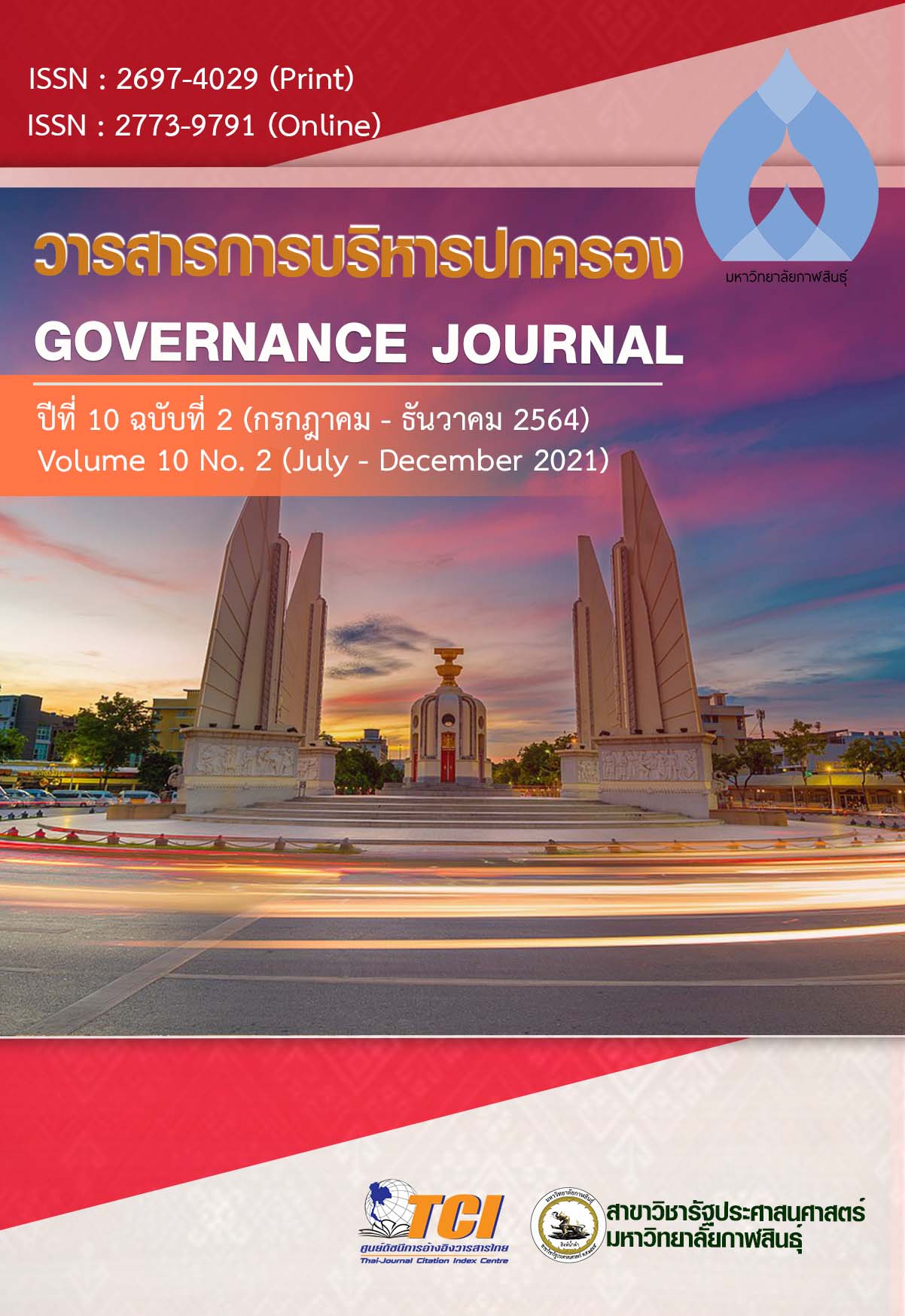ความสัมพันธ์ระหว่างเครือข่ายทางสังคมกับความเหลื่อมล้ำทางดิจิทัลในผู้สูงอายุไทย
DOI:
https://doi.org/10.14456/gjl.2021.22คำสำคัญ:
ความเหลื่อมล้ำทางดิจิทัล, ผู้สูงอายุชาวไทย, เครือข่ายทางสังคมบทคัดย่อ
งานวิจัยนี้มีวัตถุประสงค์การวิจัยสองประการ ประกอบด้วย (1) เพื่อสำรวจความสัมพันธ์ระหว่างการใช้อินเทอร์เน็ตและเครือข่ายทางสังคมในกลุ่มผู้สูงอายุชาวไทย และ (2) เพื่อจัดทำข้อเสนอแนะเชิงนโยบายเพื่อแก้ไขความเหลื่อมล้ำทางดิจิทัลในกลุ่มผู้สูงอายุของประเทศไทย ระเบียบวิธีวิจัยที่ใช้เป็นระเบียบวิธีวิจัยเชิงปริมาณ ข้อมูลหลักของงานวิจัยชิ้นนี้ มาจากชุดข้อมูลจากการสำรวจค่านิยมโลกคลื่นที่ 7 กลุ่มตัวอย่าง คือ ผู้สูงอายุ ชาวไทยอายุตั้งแต่ 60 ปีขึ้นไปจากทุกภูมิภาคของประเทศไทย จำนวน 288 คน การสุ่มตัวอย่างใช้เทคนิคการสุ่มตัวอย่างแบบหลายขั้น สถิติที่ใช้ในการวิจัยประกอบด้วย การใช้ความถี่และร้อยละเพื่ออธิบายข้อมูลพื้นฐานเกี่ยวกับตัวแปร และสถิติถดถอยโลจิสติกแบบลดหลั่นในการวิเคราะห์ความสัมพันธ์ระหว่างการใช้อินเทอร์เน็ตและการมีเครือข่ายทางสังคม หลังจากควบคุมตัวแปรลักษณะทางประชากรศาสตร์ ผลการวิจัยพบว่า กลุ่มตัวอย่างผู้สูงอายุชาวไทยที่มีเครือข่ายทางสังคมในรูปแบบการเป็นสมาชิกของวัด โบสถ์ หรือองค์กรทางศาสนาอื่น ๆ การเป็นสมาชิกของสมาคมกีฬาหรือองค์กรสันทนาการต่าง ๆ หรือการรับรู้ข่าวสารจากการพูดคุยกับกลุ่มเพื่อนหรือคนรู้จัก มีแนวโน้มในการเป็นผู้ใช้อินเทอร์เน็ตมากกว่ากลุ่มตัวอย่างผู้สูงอายุชาวไทยที่ไม่มีเครือข่ายทางสังคม ผลการวิจัยสามารถนำไปประยุกต์ใช้เป็นนโยบาย เพื่อเพิ่มโอกาสการเข้าถึงอินเทอร์เน็ตในกลุ่มผู้สูงอายุ โดยเฉพาะในกลุ่มผู้สูงอายุที่มีสถานะทางเศรษฐกิจและสังคม และมีระดับการศึกษาต่ำทั้งในพื้นที่เขตเมืองและชนบท ผ่านการใช้ประโยชน์จากเครือข่ายทางสังคมและความความสัมพันธ์ที่แน่นแฟ้นในกลุ่มผู้สูงอายุชาวไทย
Downloads
เอกสารอ้างอิง
เอกสารอ้างอิง
ภาษาไทย
กระทรวงการคลัง สำนักงานสำนักงานปลัดกระทรวงการคลัง กลุ่มสารนิเทศการคลัง.
ข่าวกระทรวงการคลังฉบับที่ 104/2563. สืบค้นจาก https://คนละ
ครึ่ง.com/asset/download/ข่าวแถลง กระทรวงการคลังฉบับที่20104-
pdf.
โซเชียลแห่แชร์คลิป "ตายายนั่งป้อนข้าว รอลงทะเบียนเยียวยา "เราชนะ" ที่กำแพงเพชร
เห็นแล้วน่าสงสาร. 2564. คมชัดลึก. สืบค้นจาก https://www.komchadluek.
net/news/local/458670.
ไทยรัฐออนไลน์. (2564, 26 มกราคม). “คลัง-กรุงไทย” ช่วยเหลือ 2 ตายาย ไร้สมาร์ทโฟน
เข้าถึงแอปฯ ถุงเงิน. ไทยรัฐ. สืบค้นจาก https://www.thairath.co.th/ business/economics/2020457.
มูลนิธิสถาบันวิจัยและพัฒนาผู้สูงอายุไทย. 2559. สถานการณ์ผู้สูงอายุไทย พ.ศ.2559.
สืบค้นจาก http://www.dop.go.th/download/knowledge/en15181
-108_0.pdf.
เรวัต แสงสุริยงค์. 2561. ความพยายามลดช่องว่างด้านดิจิทัลในสังคมไทย.
Veridian E-Journal Silpakorn University ฉบับภาษาไทย
มนุษยศาสตร์ สังคมศาสตร์ และศิลปะ, 11(3): 1,056-1,084.
วรรษา เปาอินทร์. 2560. “Thailand Health 4.0 Challenges and Opportunities”.
Journal of the Thai Medical Informatics Association, 1: 31-36.
สำนักงานพัฒนารัฐบาลดิจิทัล. 2564. แอปพลิเคชันหมอชนะ. สืบค้นจาก https://
www.dga.or.th/our-services/digital-platform-services/morchana-
app/.
อภิชาติ ศิริบุญญกาล และศรุดา สมพอง. 2562. บทบาทของกระทรวงดิจิทัลเพื่อ
เศรษฐกิจและสังคมใน การขับเคลื่อนยุทธศาสตร์เศรษฐกิจและสังคมดิจิทัล.
วารสาร มจร สังคมศาสตร์ปริทรรศน์, 8(3): 255-269.
อรพิม สุขคง เกษตรชัย และหีม และวันชัย ธรรมสัชการ. (2563). ความเหลื่อมล้ำ
ทางดิจิทัลผ่านการวิเคระห์ปัจจัยระดับบุคคล. วารสารศิลปะศาสตร์
มหาวิทยาลัยแม่โจ้, 8(2): 250-265.
ภาษาอังกฤษ
Aljafari V. & Sykes T. A. 2013. “Digital Divide Initiative Success in
Developing Countries: a Longitudinal Field Study in a Village In
India. Information Systems Research, 24(2): 239–260.
Correa, T., & Pávez, I. 2016. “Digital Inclusion in Rural Areas: A Qualitative
Exploration of Challenges Faced by People from Isolated
Communities”. Journal of Computer‐Mediated Communication,
(3): 247–263.
De Vaus, D. 2014. Surveys in Social Research. 6th ed. New York: Routledge.
Esteban-Navarro, M. et.al. 2020. “The Rural Digital Divide in the Face of
the COVID-19 Pandemic in Europe -- Recommendations from a
Scoping Review”. Informatics, 7(4): 54-72.
EVS/WVS. 2021. “European Values Study and World Values Survey: Joint
EVS/WVS 2017-2021 Dataset (Joint EVS/WVS)”. JD Systems
Institute & WVSA. Dataset Version 1.1.0, doi:10.14281/18241. 11.
Huang, J.S. 2005. “Diffusion Theory in an Internet Environment: Testing Four
Key Components”. Proceedings of the 6th International
Symposium on Online Journalism Austin, TX April 8-9.
Retrieved from https://isoj.org/wp-content/uploads/2018/01/
huang.pdf.
Loichinger, A. & Pothisiri, W. 2018. “Health prospects of older persons in
Thailand: the role of education”. Asian Population Studies,
(3), 310-329.
Luger, T.M. et.al. 2016. “Older Veteran Digital Disparities: Examining the
Potential for Solutions within Social Networks”. Journal of
Medical Internet Research, 18(11): e296.
Organization for Economic Co-operation and Development. 2001.
Understanding the Digital Divide. Paris: OECD.
Peral, B., Gaitán, J.A., & Ramos, A.V. 2015. “From Digital Divide to
Psycho-digital Divide: Elders and Online Social Networks”. Media
Education Research Journal, 45(23): 57-64.
Prieto G. & Leahy D. (2012). “Online Social Networks and Older People”. In
Miesenberger K., Karshmer A., Penaz P., Zagler W. (eds) Computers
Helping People with Special Needs, Berlin: Springer, 666-672.
Ramzan, M., Adeeb, H., Asif, M. 2019. “Factors Motivating Older
Population for Social Media Adoption”. Library Philosophy and
Practice (e-journal). 3795. Retrieve from https://digitalco
mmons.unl.edu/libphilprac/3795.
Rashid, A.T. 2016. “Digital Inclusion and Social Inequality: Gender
Differences in ICT Access and Use in Five Developing Countries”.
Gender, Technology and Development, 20(3): 306-332.
Rogers, E. 2003. Diffusion of Innovations. 5thed. New York: The Free
Press.
United Nations Department of Economic and Social Affairs Population
Division (2017). World Population Prospects: The 2017 Revision,
Key Findings and Advance Tables. Working Paper No. ESA/P/
WP/248.
Valente, T. W. 2012. “Network interventions”. Science, 337(6090), 49-53.
Valente, T. W. 1996. “Social Network Thresholds in The Diffusion of
Innovations”. Social networks, 18(1), 69-89.
Wang, T., Guo, X., & Wu, T., 2021. “Social Capital and Digital Divide:
Implications for Mobile Health Policy in Developing Countries”.
Journal of Healthcare Engineering, 2021 Jan 26: 6651786. doi:
1155/2021/6651786.
Zhang, M. & Wolff, R.S. 2004. “Crossing the Digital Divide: Cost-Effective
Broadband Wireless Access for Rural and Remote Areas”. IEEE
Communications Magazine, 42(2): 99 – 105.
Zhao, S, & Elesh, D. 2007. “The Second Digital Divide: Unequal Access
to Social Capital in the Online World”. International Review of
Modern Sociology, 33(2): 171-192.
Translated Thai References
Apichat Siriboonyakarn & Saruda Sumpo. 2019. “Role of Ministry of
Digital Economy and Society to Driving Strategic of Digital
Economy and Society”. Journal of MCU Social Science Review,
(3): 255-269.
Digital Government Development Agency. 2021. Mao Chana Application.
Retrieved from https://www.dga.or.th/our-services/digital-plat
form-services/morchana-app/.
Foundation of Thai Gerontology Research and Development Institute.
Situation of Thai Elderly 2016. Retrieved from http://
www.dop.go.th/download/knowledge/en1518139087-108_0.pdf.
Ministry of Finance, Office of Permanent Secretary for Finance, Finance
General Information Office Group. 2020. “Ministry of Finance News
No. 104/2563”. Retrieved from https://คนละครึ่ง.com/asset
/download/ข่าวแถลง กระทรวงการคลังฉบับที่20104-2563.pdf.
Orapim Sukkong, Kasetchai Laeheem, & Wanchai Dhammasaccakarn.
“Digital Divide through Individual Factors Analysis”.
Journal of Liberal Arts, Maejo University, 8(2): 250-265.
Rewat Sangsuriyong. 2018. “Effort to Bridge Digital Divide in Thai
Society”. Veridian E-Journal,Silpakorn University (Humanities,
Social Sciences and Arts) , 11(3): 1,056-1,084.
Social Media Shared Clips “Grandfather sit and fed while Waiting for
Registration to “Rao Chana” at Kamphaeng Phet, too Sad to See. 2021.
Komchadluek. Retrieved from https://www.komchadluek.
net/news/local/458670.
Thairath online. 2021. “Ministry of Finance-Krung Thai” Helped Two Grand
Father and Grand Mother Who Did Not Have Mobile Phone to Gain
Access to Tung Ngen App. Thairath. Retrieved from https://www.
thairath.co.th/business/economics/2020457.
Wansa Paoin. 2017. “Thailand Health 4.0 Challenges and Opportunities”.
Journal of the Thai Medical Informatics Association, 1: 31-36.
ดาวน์โหลด
เผยแพร่แล้ว
รูปแบบการอ้างอิง
ฉบับ
ประเภทบทความ
สัญญาอนุญาต

อนุญาตภายใต้เงื่อนไข Creative Commons Attribution-NonCommercial-NoDerivatives 4.0 International License.








